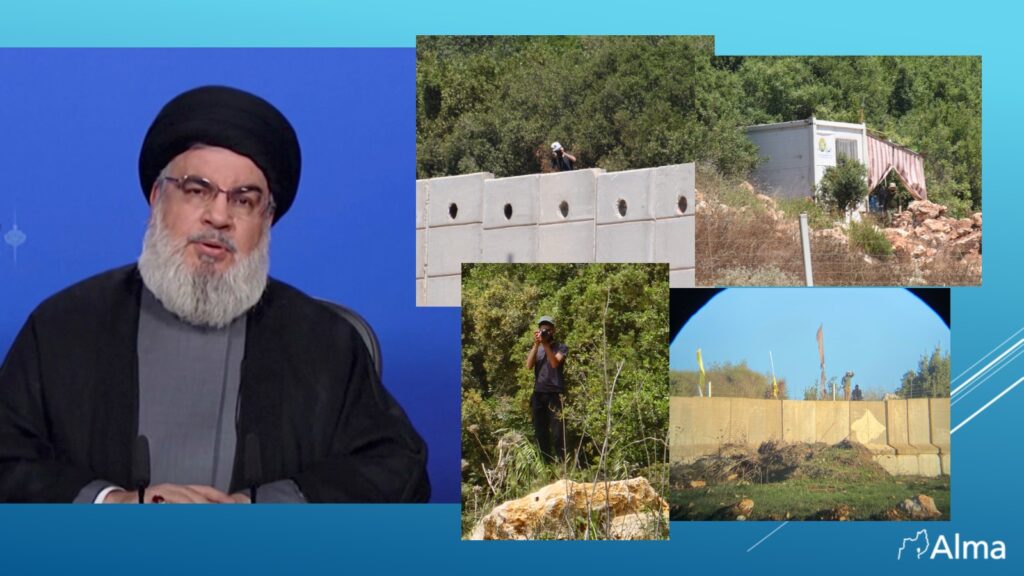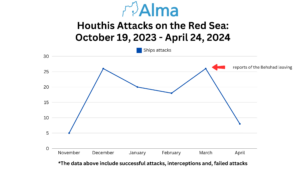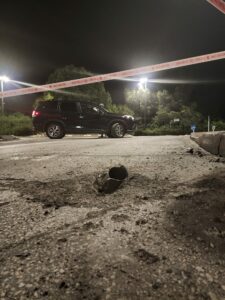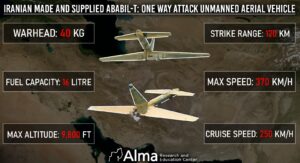Since the summer of 2022, we at the Alma Center have been assessing that Hezbollah is moving toward conflict with Israel. During a speech by Hezbollah chief Hassan Nasrallah last summer, he gave clear ideological and religious authorization for such a confrontation.
At the same time, we saw a growing presence of Hezbollah commando operatives and the construction of military positions under civilian cover along the border.
To understand Hezbollah, one must first understand that its fundamental goal is to export the Islamic Revolution to Lebanon – and to take over the country. To achieve this fundamental goal, Hezbollah manages a long-term strategy (and not a strategy based on “tomorrow morning.”)
This strategy is the basis of Hezbollah’s thinking, considerations, risk management, and conduct. Israel is merely a tool for realizing this goal (Hezbollah knows full well that it will not conquer Israel in the near future, and its propaganda and psychological war in this regard are primarily aimed at the Lebanese audience and to maintain its narrative within Lebanon).
However, this does not explain the change in Hezbollah’s risk management over the past year and a half.
First, one can see from the timeline that there is not necessarily a connection between Hezbollah’s risk-taking and the internal crisis in Israel. The provocations began in the summer of 2022 under Israel’s previous government.
Second, Hezbollah, which must also justify its existence, appears to believe that the time has come to activate a mechanism to accelerate its takeover of Lebanon and use Israel as a platform to do this through a confrontation against it.
Hezbollah wants and needs this confrontation, and from its perspective,17 years since the last war with Israel, it is time for a reboot, after which, Hezbollah believes, the time will come for an “upgrade” that will accompany its takeover status in Lebanon.
Hezbollah’s power today is enormous both at the military and civilian levels. From its perspective, the Second Lebanon War contributed greatly to building its military and civilian power.
The power of ‘the state of Hezbollah’ is even more pronounced when compared to the infrastructure and economic weakness of the state of Lebanon. Hezbollah’s interest is to preserve and even enhance this prominence.
In its view, war with Israel will serve this goal in Hezbollah’s view, and after the war, Hezbollah believes its power will grow further within Lebanon.
Hezbollah may also believe that war will bring more money to the Lebanese state, and in this respect, in the face of the economic crisis – it has little to lose.
Hezbollah is the strongest body in Lebanon today. Although it will be harmed in the war majorly, it will still remain the strong body in Lebanon, compared to its rivals in Lebanon, who will grow weaker.
The civilian infrastructure Hezbollah manages through its Executive Council will retain its relative strength compared to the other power elements in Lebanon.
Zooming out – If one examines Hezbollah’s patron in Tehran – here, too, the timing can certainly match the interest of the Iranian regime. Today, Iran is more confident in its achievements in the nuclear program, Syria, and Yemen, the military cooperation with Russia, and the normalization agreements with the Gulf states.
In addition, it may assess that it is time to “sacrifice” Lebanon to divert Israel’s military efforts from the Iranian nuclear program.
How will Hezbollah justify the war to the Lebanese? On what grounds? Hezbollah, backed by the Lebanese government, places disputes on the land border with Israel on the table.
Over the years, 13 Lebanese disputes regarding the UN demarcation have marked the land border. These disputes come on top of the dispute over the Sheba Farms – an area that Israel conquered from Syria in 1967 but which Lebanon claims belongs to it.
Within this area is the village of Ghajar, whose residents are Israeli citizens. Yet the UN marked the border in the middle of the village – so its northern part is considered Lebanese.
What is the scope of the conflict that Hezbollah wants here? Opinions are divided, even within the Alma Center.
Some believe Hezbollah is interested in the destruction of Lebanon as this will enhance its power (in line with what it learned retrospectively from the war in 2006) and therefore aims for a full-scale war. The visit to Beirut on Wednesday by Iranian General Esmail Qaani, Commander of Quds Force, who is in fact, Hezbollah’s commander, can bolster this assessment.
Others believe that Hezbollah is interested in a limited conflict because it does not want widespread damage to the Lebanese state, and in any case, it estimates that at this time Israel will not respond to limited attacks against it (launched using a Palestinian proxy) by entering into a war.
In both cases, it is clear that the northern border is no longer what it was up to a year and a half ago. It is clear that Hezbollah’s provocations are growing and with them tensions, and that Hezbollah is already planning the next terrorist act (which would be the fourth in the last six months) against Israel.
The Israeli government and the IDF face complex dilemmas in protecting Israeli citizens and in dealing with the new situation on the northern border. As the IDF pointed out in recent months, the potential for war in the north is growing.






